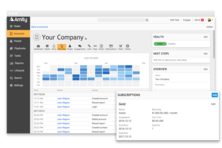Customer success software helps to provide businesses with a unified, comprehensive look at all valuable customer data collated from different third-party systems such as CRM platforms, customer support ticketing solutions, email services, live chat and more. The software provides a set of tools designed to help customer success teams deliver the kind of experience and outcomes their customers expect when using their products and/or services.
Customer success platforms work by collecting data from various existing business process solutions you may already be using. The data is then funneled into the customer success solution, serving as a centralized source for gaining valuable customer insights, customer engagement analytics, product usage and adoption, downloads, as well as other important metrics and customer signals.
Some of the main features and tools present in most top-tier customer success platforms include products/service usage tracking, customer engagement analytics, complete customer profiles, customer health scoring, real-time insights, customer segmentation and the automation of workflows and other management processes.
One of the key objectives of utilizing the full potential of a feature-rich customer success software application is to minimize customer churn while maximizing upsell opportunities for the company. Let’s not forget, however, that maintaining a strong customer relationship is still a major goal for this type of software solution. And providing the best experience in every customer journey, while they patronize your product and/or service, is critical to a strong and sustainable relationship.

 Amity helps users to monitor changes in customer health or trends, recommends optimal actions and quantifies effectiveness.
Amity helps users to monitor changes in customer health or trends, recommends optimal actions and quantifies effectiveness.
Customer success platforms come in many forms. Some products in the market are marketed as a fully-featured customer success management suite, offering a wide variety of features and capabilities you can use to manage customer relationships, experiences and satisfaction for the entire customer journey.
There are products available that are more focused on a specific aspect of the customer experience management process, putting more emphasis on proactive customer success initiatives by allowing for usage-based communication in-product. This is the kind of product in the customer success software category that is tailored perfectly for small businesses and startups looking for a cost-effective approach in collecting valuable data from customers based on usage, adoption and feedback.
Moreover, there are other products that focus more on providing usage statistics and customer segmentation features. These are useful to customer success teams and managers for initiating seamless communications from within other applications. These types of products can also be utilized by account managers and other customer management teams like marketing, customer support and sales. They will most likely be integrated with full-featured customer success management suites, rather than be in direct competition with such platforms.
CustomerSuccessBox, Natero and Amity are just a few of the software solutions that belong in the customer success management category. CustomerSuccessBox is marketed to B2B software-as-a-service (SaaS) companies with customer success teams requiring a reliable platform for managing multiple customers remotely.
Natero is a customer success software platform designed to help customer management teams by integrating predictive analytics with CRM systems, customer support and billing, along with business best practices.
Amity, on the other hand, is a fully integrated customer success solution. It provides small and medium-sized businesses a capable platform enabling them to completely understand their consumer base, identify trends and behaviors, as well as determine more opportunities to enhance customer engagement, marketing and sales.
However, despite the few differences among these customer success management platforms, they do share a common goal—to provide businesses with a specific platform that focuses on customer success operations. Just like marketing teams with marketing automation software and sales teams with their CRM systems, customer success teams need this software solution to automate and analyze their own key processes.
Customer success software provides three key capabilities to SMBs and large enterprises that will allow them to retain and grow their customer base, improve customer experiences and engagement.
This type of software solution allows you to:
The basic idea of using customer success software is really simple. By ensuring your customers are successful when using your products and/or services, your own success as a business will eventually follow.
Primarily, it helps to minimize customer churn and increases upsells. By taking advantage of the platform’s full capabilities, you can, for example, identify problematic customers early on and turn things around for them before it becomes more difficult to do so.
Customer success software also has the potential to increase both lifetime and shareholder values for your business. The truth is the whole concept of proactive customer success is not just about minimizing the risk of customer churn and resolving potential issues before they become full-blown detriments. This kind of platform is also driving customer engagement, satisfaction and retention, with the end goal of increasing your revenue and growing your business.
Lastly, these solutions can help to successfully align your business around your customer base. Looking at it from a strategic point-of-view, customer success software facilitates the process of having your company’s different operational and functional teams rally around your customers, anticipating their needs and helping them gain success. When done properly, the platform can become the ultimate bridge between your company and its customers.